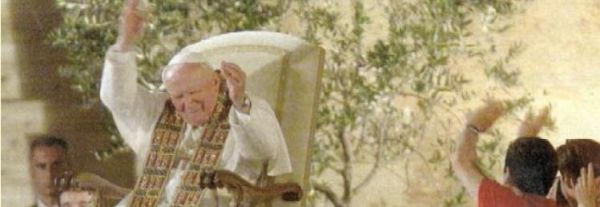1. In the episode of the wedding at Cana, St John presents Mary’s first intervention in the public life of Jesus and highlights her co-operation in her Son’s mission.
At the beginning of the account the Evangelist tells us that “the Mother of Jesus was there” (Jn 2:1), and, as if to suggest that her presence was the reason for the couple's invitation to Jesus and his disciples (cf. Redemptoris Mater, n. 21), he adds “Jesus also was invited to the marriage, with his disciples” (Jn 2:2). With these remarks, John seems to indicate that at Cana, as in the fundamental event of the Incarnation, it is Mary who introduces the Saviour.
The meaning and role of the Blessed Virgin’s presence become evident when the wine runs out. As a skilled and wise housewife, she immediately notices and intervenes so that no one’s joy is marred and, above all, to help the newly married couple in difficulty.
Turning to Jesus with the words: “they have no wine” (Jn 2:3), Mary expresses her concern to him about this situation, expecting him to solve it. More precisely, according to some exegetes, his Mother is expecting an extraordinary sign, since Jesus had no wine at his disposal.
2. The choice made by Mary, who could perhaps have obtained the necessary wine elsewhere, shows the courage of her faith, since until that moment Jesus had worked no miracles, either in Nazareth or in his public life.
At Cana, the Blessed Virgin once again showed her total availability to God. At the Annunciation she had contributed to the miracle of the virginal conception by believing in Jesus before seeing him; here, her trust in Jesus' as yet unrevealed power causes him to perform his “first sign”, the miraculous transformation of water into wine.
In that way she precedes in faith the disciples who, as John says, would believe after the miracle: Jesus “manifested his glory; and his disciples believed in him” (Jn 2:11). Thus, Mary strengthened their faith by obtaining this miraculous sign.
3. Jesus’ answer to Mary’s words, “O woman, what have you to do with me? My hour has not yet come” (Jn 2:4), appears to express a refusal, as if putting his Mother’s faith to the test.
According to one interpretation, from the moment his mission begins Jesus seems to call into question the natural relationship of son to which his mother refers. The sentence, in the local parlance, is meant to stress a distance between the persons, by excluding a communion of life. This distance does not preclude respect and esteem; the term “woman” by which he addresses his Mother is used with a nuance that will recur in the conversations with the Canaanite woman (cf. Mt 15:28), the Samaritan woman (cf. Jn 4:21), the adulteress (cf. Jn 8:10) and Mary Magdalene (cf. Jn 20:13), in contexts that show Jesus' positive relationship with his female interlocutors.
With the expression: “O woman, what have you to do with me?”, Jesus intends to put Mary’s co-operation on the level of salvation which, by involving her faith and hope, requires her to go beyond her natural role of mother.
4. Of much greater import is the reason Jesus gives: “My hour has not yet come” (Jn 2:4).
Some scholars who have studied this sacred text, following St Augustine’s interpretation, identify this “hour” with the Passion event. For others, instead, it refers to the first miracle in which the prophet of Nazareth’s messianic power would be revealed. Yet others hold that the sentence is interrogative and an extension of the question that precedes it: “What have you to do with me? Has my hour not yet come?”. Jesus gives Mary to understand that henceforth he no longer depends on her, but must take the initiative for doing his Father’s work. Then Mary docilely refrains from insisting with him and instead turns to the servants, telling them to obey him.
In any case her trust in her Son is rewarded. Jesus, whom she has left totally free to act, works the miracle, recognizing his Mother’s courage and docility: “Jesus said to them, ‘Fill the jars with water’. And they filled them up to the brim” (Jn 2:7). Thus their obedience also helps to procure wine in abundance.
Mary’s request: “Do whatever he tells you”, keeps its ever timely value for Christians of every age and is destined to renew its marvellous effect in everyone's life. It is an exhortation to trust without hesitation, especially when one does not understand the meaning or benefit of what Christ asks.
As in the account of the Canaanite woman (Mt 15:24-26), Jesus’ apparent refusal exalts the woman’s faith, so that her Son’s words, “My hour has not yet come”, together with the working of the first miracle, demonstrate the Mother's great faith and the power of her prayer.
The episode of the wedding at Cana urges us to be courageous in faith and to experience in our lives the truth of the Gospel words: “Ask, and it will be given you” (Mt 7:7; Lk 11:9).
[Pope John Paul II, General Audience 26 February 1997]












